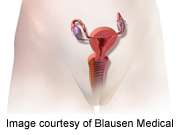(HealthDay)—For women younger than 21 years, Papanicolaou (Pap) and human papillomavirus (HPV) testing are unnecessarily high, according to a study published in the September issue of the American Journal of Obstetrics & Gynecology.
Noting that in December 2009, the American Congress of Obstetricians and Gynecologists (ACOG) recommended that women younger than 21 years should not receive Pap or HPV tests, Jacqueline M. Hirth, M.P.H., Ph.D., from the University of Texas Medical Branch in Galveston, and colleagues conducted a retrospective secondary data analysis of administrative claims data to examine the frequency of these tests among 178,898 12- to 20-year-old females with a paid claim for a well-woman visit in 2008, 2009, or 2010.
The researchers observed a decrease in Pap testing as part of the well-women exam, from 77 percent in 2008 and 2009 to 57 percent by December 2010. HPV testing remained stable across the study period. Pap testing in 2010 correlated with a diagnosis of cervical cell abnormalities in 2009. A stronger association was noted between having a previous Pap test with having a test in 2010.
"These data show that some physicians are adjusting their practices among young women according to ACOG guidelines, but Papanicolaou and HPV testing among insured women younger than 21 years of age still remains unnecessarily high," the authors write.
More information:
Abstract
Full Text (subscription or payment may be required)
Journal information: American Journal of Obstetrics and Gynecology
Copyright © 2013 HealthDay. All rights reserved.





















